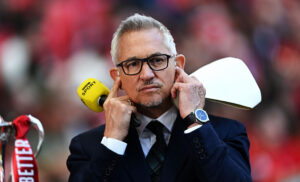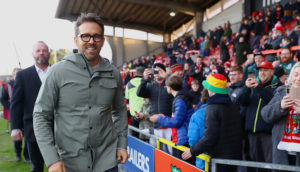On 2 May 2016, in a bad-tempered game that became known as the Battle of the Bridge, Tottenham were held to a 2-2 draw by Chelsea. As the final whistle sounded, a city more than 100 miles away started to celebrate: the result confirmed Leicester, 5000-1 at the start of the season, as the most improbable league champions in English history.
To cap it off, 13 minutes after the final whistle, Mark Selby, “the Jester from Leicester”, won the World Snooker Championship for the second time. Both Selby and the Foxes had followed in the footsteps of Leicester Tigers, who secured their eighth Rugby Union Premiership three years previously, and Leicestershire County Cricket Club, who won their third T20 Cup in 2011. Leicester, it seemed, was the centre of the sporting world.
In the years since, however, the cricket team has not won anything, while the Tigers only won the Premiership again in 2022 after a long drought. Although Selby, recovering from a run of poor form related to his depression, reached the final of the World Snooker Championship again this month, he lost to the Belgian Luca Brecel. Then, on Sunday, came the greatest disappointment of all, as Leicester City were relegated from the Premier League. Seven years after that glorious Bank Holiday Monday, the city’s decline has started to feel endemic. How did it come to this?
There used to be a bar at Leicester station — or rather, a counter selling pasties and sandwiches that also sold cans of lager and had a small room next to it, fitted out with perhaps half a dozen small tables. Having written their match reports, London-based journalists would meet there before getting the train home. Its walls were a celebration of great Leicester personalities: not just David Attenborough and Gary Lineker, but Willie Thorne, Engelbert Humperdinck, Kate O’Mara, Showaddywaddy…
The bar disappeared years ago and, on the day Leicester lifted the league title, its absence was unnerving but also, it seemed, rather fitting. Andrea Bocelli sang on the pitch before kick-off as the grimy traditions of its former stadium Filbert Street yielded to the slightly antiseptic surrounds of the King Power: here, the fans are obsessed, in a way no other club’s are, by those weird cardboard clappers, as though they suddenly felt banging their hands together was not quite the modern thing. It was better than what had gone before but just as surely something had been lost. If that bar still existed, Jamie Vardy, Riyad Mahrez and Wes Morgan, the heroes of 2015-16, would surely take pride of place.
A Champions League quarter-final followed, then two fifth-place finishes and, in 2021, a first ever FA Cup success. Even last season, widely seen as a disappointment, Leicester finished eighth. But did Leicester itself ever seem like a city on the up? Perhaps sport casts an illusory glow. Perhaps too much was read into the discovery of Richard III under a car park in the city a decade ago, but it served to underline the impression of Leicester as a place where exciting things were happening, even if 40% of the city’s population reside in the most deprived 20% of areas in the country.
That illusion, though, was firmly punctured during the pandemic, when Leicester became the first British city to lock down following a spike that was largely blamed on Dickensian conditions in textile factories — a Sunday Times investigation later uncovered a string of sweatshops where workers were paid just £3.50 an hour. “Leicester endured the longest, most crippling lockdown of anyone in the UK,” says Lee Marlow, a Leicester fan and lecturer at De Montfort University. “You can see the effect of that in the city today. Empty shops, streets that have seen better days. Businesses, pubs, restaurants that clung on but never recovered.”
Then, in late summer last year, Leicester endured a month of unrest between predominantly British-Pakistani Muslims and predominantly British-Indian Hindus, seemingly sparked by celebrations of India’s cricketing victory over Pakistan in the Asia Cup; football is not the only sport to offer an emotionally fraught manifestation of identity. Over the following month, there were a number of outbreaks of violence and 47 arrests. While investigations agreed social media agitators bore the bulk of the responsibility, the Delhi-based Centre for Democracy, Pluralism and Human Rights blamed “ethnic enclaves” within Leicester. If there had been any naive sense of the city as a place of harmonious immigration, it disappeared then.
Yet tragedy had already interrupted the Leicester City story, when a helicopter carrying the club’s owner, Vichai Srivaddhanaprabha, crashed in October 2018, killing all on board. His son, Aiyawatt or “Top”, succeeded him as chairman of both Leicester City and King Power, the Thai retail group, his inheritance making him one of Asia’s five youngest billionaires. But King Power’s main business is duty-free shops in airports, and it was hit hard by the pandemic. This not merely restricted spending on players, but also reportedly made the owners reluctant to sack their manager Brendan Rodgers earlier this season despite the stagnation that infected the locker room.
What will happen next? Well, just as Leicester City’s success boosted the local economy, with EY putting its value at £140m, so relegation will damage it. Leicester’s games will no longer be broadcast worldwide; the city will slowly lose its name recognition. Less prestigious games mean fewer fans and lower footfall on matchdays for the city’s restaurants, shops and pubs.
But there is also something less tangible. Often, especially now that industry is disappearing, the football club is the most visible emblem of a town or city. I remember the pang of pride I felt as a native Wearsider when, walking through Addis Ababa to find Sylvia Pankhurst’s grave, I came unexpectedly upon an ancient ship’s anchor bearing the legend, “Made in Sunderland”. Work in the shipyards, obviously, was brutally tough, but what a feeling it must have been to send a vessel out into the world knowing it might be spotted in Melbourne or Buenos Aires or Tokyo — or even, inexplicably, 500 miles from the sea on Ethiopia’s central plateau. How is Sunderland projected now? Almost entirely through football. That’s why when clubs from the great provincial cities reach Wembley finals, at least those not wearied by familiarity, they habitually take over Trafalgar Square: it’s not just a celebration of self, but also a reminder to the capital that, however run down they may be, however peripheral they may feel, they are still there.
Leicester, for their part, have done something extraordinary. They didn’t just get to a Cup final: they were the most surprising league champions in English history. Their legend will linger. If any outsider wins it again, it is against Leicester that they will be measured. “In April 2016,” says Paul Simpson, a Leicester fan and founder of FourFourTwo magazine, “most supporters I knew agreed on one thing: as long as we won the Premier League we wouldn’t mind if we ended up playing non-league football in 10 years’ time. We did better than that. As devastating as this relegation is, it is, in part, a reversion to normality. This doesn’t excuse the many bad decisions made this season but it does put this season into perspective. The city will absorb the blow because it is business as usual — this is our eighth relegation in the past 50 years.”
Supporting a club, especially one below the elite level, is often frustrating. Disappointment is the default. Success can bring ecstasy but, even then, there can be a sense of taking out an emotional mortgage that will take a lifetime to pay off. But all of that is less important than football’s function as a projection of identity, perhaps especially for cities struggling with a sense of declining prestige. Go to Melbourne or Buenos Aires or Tokyo and ask what they know of Leicester, and some may talk of Attenborough or Kasabian or perhaps Joe Orton or Julian Barnes. But most, if they know the city, will know it through Vardy, Mahrez and Morgan. That’s why football matters.
“We’ve not had it easy of late,” says Marlow, “but there have been worse times. We’ll be back. We’ll dust ourselves down. What do they say? One day you’re drinking the wine, the next you’re treading the grapes. We’ll do a bit of that. And they’ll never be able to take it away from us, will they? The Premier League. The FA Cup. The King in a car park. This little city — known all over the world.”
Disclaimer
Some of the posts we share are controversial and we do not necessarily agree with them in the whole extend. Sometimes we agree with the content or part of it but we do not agree with the narration or language. Nevertheless we find them somehow interesting, valuable and/or informative or we share them, because we strongly believe in freedom of speech, free press and journalism. We strongly encourage you to have a critical approach to all the content, do your own research and analysis to build your own opinion.
We would be glad to have your feedback.
Source: UnHerd Read the original article here: https://unherd.com/




